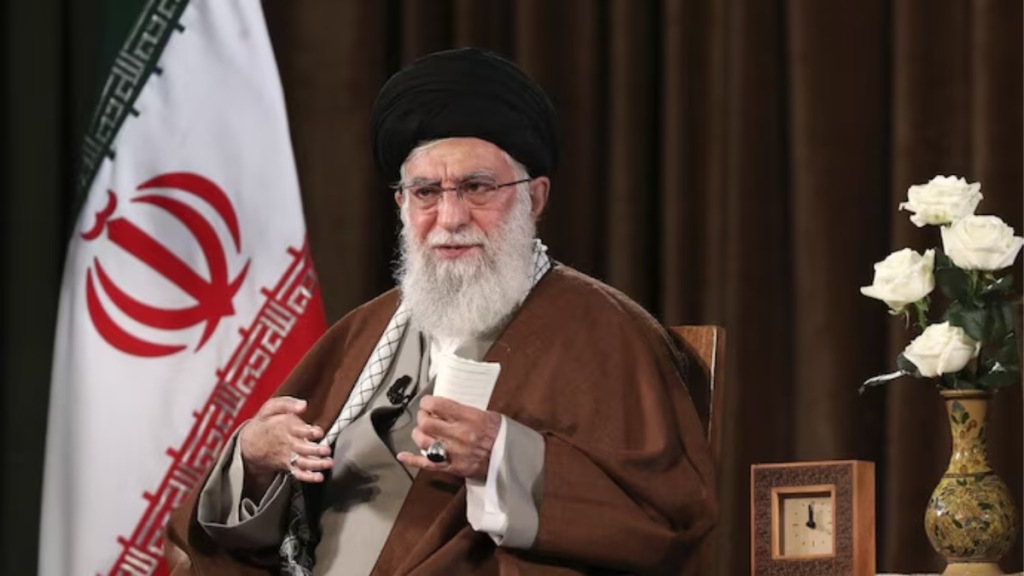The social media platform X (formerly known as Twitter) suspended an account attributed to Iran’s Supreme Leader Ayatollah Ali Khamenei, which had posted messages in Hebrew. The account, newly created on Sunday, was disabled early Monday with a brief notice stating, “X suspends accounts which violate the X Rules.” X, owned by Elon Musk, did not provide additional details regarding the suspension, nor did it respond to requests for comment from the Associated Press.
Khamenei’s message in Hebrew
The suspension came shortly after Khamenei addressed escalating tensions with Israel. Following Israel’s recent strike against Iran, the Supreme Leader cautioned against overreacting but emphasized Iran’s preparedness, alluding to Israel’s potential underestimation of Iranian resilience. His message, also posted in English, warned, “Zionists are making a miscalculation concerning Iran. They don’t know Iran… [or] the power, initiative, and determination of the Iranian people.” Although Khamenei has several long-standing accounts on X in various languages, this new account, reportedly established for Hebrew-language messages, was suspended shortly after posting an Islamic greeting and a summary of Khamenei’s remarks.
The social media action follows Israel’s unprecedented attack on Iran over the weekend. Iranian state media reported that four soldiers and one civilian died in the strikes, which Israeli authorities justified as a response to recent Iranian missile activity. In reaction, Gen Hossein Salami, head of Iran’s Revolutionary Guard, condemned the attack, labelling it “illegitimate and illegal” and suggesting it demonstrated Israel’s “miscalculation and inability” to achieve battlefield objectives.
Global conflict and social media
The events have reverberated beyond Iran, with Iraq submitting a formal protest to the United Nations over Israeli use of its airspace for the attack. Iraq’s Prime Minister Mohammed Shia al-Sudani called on his foreign minister to discuss the situation with the United States, amid accusations from Iran-backed Iraqi militia Kataib Hezbollah that U.S. forces coordinated with Israel.
At Iran’s request, the UN Security Council scheduled an emergency meeting, with Russia, China, and Algeria voicing their support for Iran’s appeal. Iran’s President Masoud Pezeshkian criticised Israel’s actions, suggesting that the US has encouraged Israel’s aggressive stance. Pezeshkian asserted that while Iran does not seek war, it would defend its rights and respond “appropriately” to aggression.
In the broader context, Kremlin spokesman Dmitry Peskov reported that Russia is engaging with all parties involved and promoting restraint as tensions mount. He emphasised Russia’s role in de-escalation efforts, though the situation remains “extremely tense.”
This wave of regional tensions and the suspension of Khamenei’s new X account highlight the fraught state of diplomacy and social media’s role in global conflicts.
Who is Ayatollah Ali Khamenei?
Ayatollah Ali Khamenei is a central figure in Iranian politics and religious leadership. He has held the position of Supreme Leader of Iran since 1989, succeeding Ayatollah Ruhollah Khomeini. Prior to this role, Khamenei served as Iran’s President from 1981 to 1989. As Supreme Leader, he holds the highest authority in Iran, overseeing the military, foreign relations, and internal security.
Khamenei’s Recent Controversy with India
Ayatollah Khamenei recently stirred controversy in India with comments on the treatment of Indian Muslims. In a post on X (formerly Twitter) during Prophet Mohammed’s birth anniversary, he highlighted the “suffering” of Muslims in India alongside those in Gaza and Myanmar, calling for solidarity within the Islamic world against the oppression of Muslims globally. “We cannot consider ourselves to be Muslims if we are oblivious to the suffering that a Muslim is enduring in #Myanmar, #Gaza, #India, or any other place,” he wrote, stressing the need for unity as a counter to forces that aim to divide and weaken the Islamic community.

